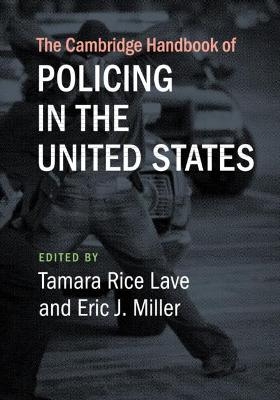
The Cambridge Handbook of Policing in the United States
Cambridge University Press (Verlag)
978-1-108-43050-0 (ISBN)
The Cambridge Handbook of Policing in the United States provides a comprehensive collection of essays on police and policing, written by leading experts in political theory, sociology, criminology, economics, law, public health, and critical theory. It unveils a range of experiences - from the police chief of a major metropolitan force to ordinary people targeted for policing on the street - and asks important questions about whether and why we need the police, before analyzing the law of policing, police use of force, and police violence, paying particular attention to the issue of discrimination against marginalized and vulnerable communities at the blunt end of police interference. The book also discusses technological innovations and proposals for reform. Written in accessible language, this interdisciplinary work will be a valuable resource for anyone interested in understanding the present and future of policing in the United States.
Tamara Rice Lave is a Professor of Law at the University of Miami. She is also a Criminal Justice Studies Fellow at the University of California, Berkeley. Before getting her Ph.D., Professor Lave was a deputy public defender in San Diego for ten years where she handled a variety of cases. Eric J. Miller is a Professor and Leo J. O'Brien Fellow at Loyola Law School in Los Angeles. He is currently the Chair-Elect of the Association of American Law Schools (AALS) Section on Criminal Justice, and the co-founder of the Policing Los Angeles Forum. Miller is a nationally recognized expert on the police and policing who has provided testimony to the United States Congress House Judiciary Committee and the United States Sentencing Commission.
Part I. The View from the Streets: 1. Policing as though the public really matters: a call for outcome-based policing Cameron McLay; 2. Policing in St Louis: 'I feel like a runaway slave sometimes' Thomas Harvey and Janae Staicer; Part II. Do We Need Public Police?: 3. Why we need police Justin McCrary and Deepak Premkumar; 4. Police abolitionist discourse? Why it's been missing (and why it matters) Jonathan Simon and Eduardo Bautista Duron; 5. The police as civic neighbors Eric J. Miller; 6. Pretext and justification: republicanism, policing, and race Ekow Yankah; 7. The private policing paradox Elizabeth Joh; Part III. The Law of Policing: 8. Justifying police practices: the example of arrests Rachel Harmon; 9. Police interrogation and suspect confessions Richard A. Leo; 10. How fear shapes policing in the US David A. Harris; 11. The futile Fourth Amendment: understanding police excessive force doctrine through an empirical assessment of Graham v. Connor Osagie K. Obasogie and Zachary Newman; 12. The problematic prosecution of an Asian American police officer: notes from a participant in People v Peter Liang Gabriel J. Chin; Part IV. Police Force and Police Violence: 13. Confrontational proactive policing: benefits, costs, and disparate racial impacts Charles Manski and Daniel S. Nagin; 14. Race, police, and the production of capital homicides Jeff Fagan and Amanda Geller; 15. What drives variation in killings by urban police in the United States – two empirical puzzles Franklin Zimring; Part V. Discrimination: 16. Race, pedestrian checks, and the Fourth Amendment Devon W. Carbado; 17. In the shadows: policing immigration in the criminal justice system and its impact on racial disparities and identity Yolanda Vázquez; 18. Policing 'radicalization' Amna Akbar; 19. Police and the criminalization of LGBT people Ilan H. Meyer, Naomi G. Goldberg, Amira Hasenbush, Christy Mallory and Lara Stemple; 20. Police sexual violence Tamara Rice Lave; 21. Policing the mentally ill in Los Angeles on the frontlines of transinstitutionalization Natalie Pifer; Part VI. Technology: 22. The pitfalls of police technology: a minority report Kami Chavis; 23. Citizenship talk Bennett Capers; 24. Predictive policing theory Andrew Guthrie Ferguson; 25. Big data surveillance: the case of policing Sarah Brayne; Part VII. Reform: 26. Unions and police reform Stephen Rushin; 27. Procedural justice and policing: four new directions Rebecca Hollander Blumoff; 28. Moving toward an American police-community reconciliation framework David Kennedy and Jonathan Ben-Menachem.
| Erscheinungsdatum | 11.11.2020 |
|---|---|
| Reihe/Serie | Cambridge Law Handbooks |
| Zusatzinfo | Worked examples or Exercises; 10 Tables, black and white; 18 Line drawings, black and white |
| Verlagsort | Cambridge |
| Sprache | englisch |
| Maße | 176 x 253 mm |
| Gewicht | 1162 g |
| Themenwelt | Recht / Steuern ► EU / Internationales Recht |
| Recht / Steuern ► Strafrecht ► Kriminologie | |
| Recht / Steuern ► Strafrecht ► Strafverfahrensrecht | |
| Sozialwissenschaften ► Soziologie | |
| ISBN-10 | 1-108-43050-3 / 1108430503 |
| ISBN-13 | 978-1-108-43050-0 / 9781108430500 |
| Zustand | Neuware |
| Haben Sie eine Frage zum Produkt? |
aus dem Bereich


